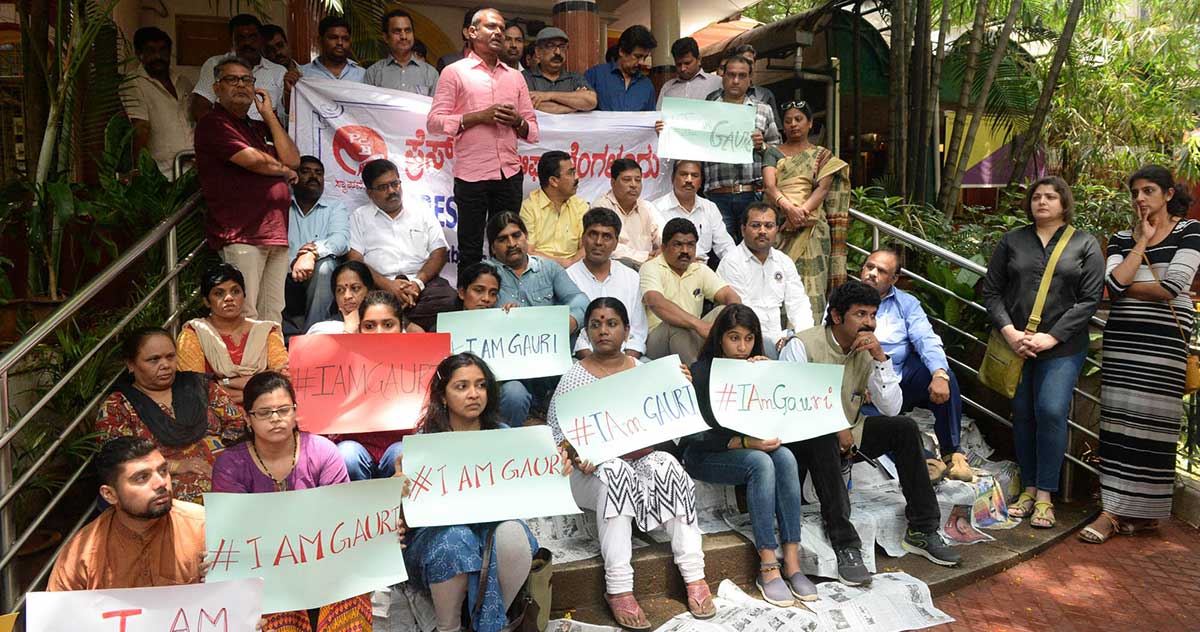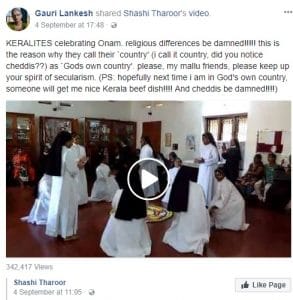Books
India Journalist’s Murder Sparks Global Outrage

Journalists protest the killing of Gauri Lankesh.
Photo Credit: Flickr
Gauri Lankesh's murder has drawn widespread international condemnation and sparked a global debate on the state of freedom of speech in India.
The murder of Gauri Lankesh, a senior Indian journalist and activist, in Bangalore on Sept 4, has triggered widespread protests in various parts of the country and a national debate on the state of freedom of expression in the world’s most populous democracy. The incident has also sparked international condemnation.
The US Embassy in India issued a rare criticism in a public statement, issued a day after the murder: “The U.S. Mission in India joins advocates of press freedom in India and worldwide in condemning the murder of respected journalist Gauri Lankesh in Bengaluru. We offer our sincere condolences to the family, friends, and colleagues of Ms. Lankesh.”
The statement issued by the United States embassy is unusual, which has not previously criticized India for press freedom. US ambassadors in other countries, including Bangladesh and Maldives, have issued strong statements following attacks on journalists, but the U.S. Embassy in India has refrained from speaking out on previous assaults of journalists in India.
Amnesty International condemns attack
Amnesty International, a non-government human rights organization headquartered in London also condemned the attack on press freedom in India. “Gauri Lankesh was never afraid of speaking truth to power. Her assassination must be thoroughly investigated and the perpetrators brought to justice,” said Amita Basu, program director at Amnesty International India. “The police must investigate whether she was killed because of her journalism.”
Committee to Protect Journalists demands investigation

The Washington DC based Committee to Protect Journalists also issued a statement condemning the attack. “We urge police in Karnataka to thoroughly investigate the murder of Gauri Lankesh, including whether journalism was a motive,” said Steven Butler, the CPJ Asian Program coordinator from Washington DC.
“India needs to address the problem of impunity in journalist murders and ensure the press can work freely,” Butler said.
On its website, the CPJ revealed that its calls to the police commissioner’s office seeking comment went unanswered.
CPJ, which tracks assaults against journalists globally, reported that at least 27 journalists have been murdered in direct retaliation for their work in India since 1992India ranks13th on CPJ’s latest Impunity Index, a measure of countries worldwide where journalists are most at risk of getting killed and the culprits walking free.
International media condemn attack
The New York Times, in its editorial, faulted Indian Prime Minister Narendra Modi for creating a climate of mob rule in India, with his right-wing Hindu supporters vilifying “secularists.”
“Lankesh had voiced concern about the climate of menace against journalists who didn’t toe the Hindu-nationalist line. If Modi doesn’t condemn her murder forcefully and denounce the harassment and threats that critics of Hindu militancy face daily, more critics will live in fear of deadly reprisal and Indian democracy will see dark days,” the New York Times wrote.
Reporters Without Borders has warned that journalists are increasingly the targets of online smear campaigns by radical nationalists, who vilify them and even threaten physical reprisals.
The activism of Gauri Lankesh
Gauri Lankesh was born on January 29, 1962 in Shivamogga district, Karnataka. She followed in the footsteps of her father, a celebrated journalist and took over his newspaper in 2000 following his death. She launched her own weekly Gauri Lankesh Patrike in 2005, which was a strong critic of right wing political forces, including the BJP.
Hours before her death, Gauri Lankesh has praised communal harmony in Kerala, a southern state of India, and also expressed her desire to taste the delicious beef curry when she visit the state.
In one of her last post in Facebook, Gauri Lankesh shared a video put up by Congress MP Shashi Tharoor featuring Christian nuns in Kerala celebrating Onam festival by playing Thiruvathirakali.
Gauri wrote: “KERALITES celebrating Onam. Religious differences be damned!!!!! this is the reason why they call their `country’ (I call it country, did you notice cheddis??) as `Gods own country’. Please, my Mallu friends, please keep up your spirit of secularism. (PS: hopefully next time I am in God’s own country, someone will get me nice Kerala beef dish!!!! And cheddis be damned!!!!)”.
